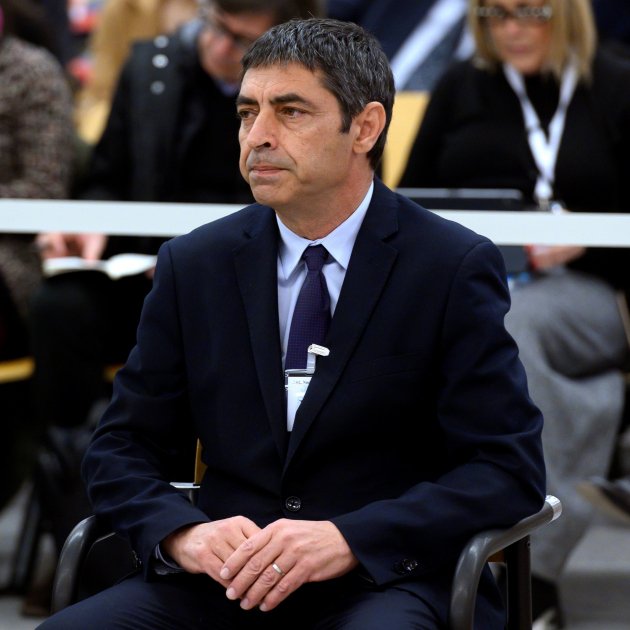Eleven months ago, he was testifying in the Supreme Court during the trial of pro-independence Catalan civil and political leaders. Today, former Catalan police chief ("major") Josep Lluís Trapero entered the dock himself, facing a charge of rebellion for his part in the events of autumn 2017.
This first day of the case was only meant to see a morning session; in the end, it was almost 7pm before it was over. For 6 hours, Trapero went step by step through an already known narrative with the court's deputy prosecutor, Miguel Ángel Carballo. The only difficult moment for the police chief was when he couldn't explain why the open doors events at some of the schools to be used as polling stations weren't prevented from going ahead. The rest was easy for a police officer looking to distance himself as far as possible from the actions taken by the politicians.
A lot of today's material was already known: the design of the Mossos operation on 1st October, the events of the 20th September and the meetings in which he advised the government to call off the referendum over the potential for public safety problems. He said that, in the end, a total of 434 ballot boxes were seized. But today Trapero was far blunter in describing his views of the government's plans, describing their aims as "illegal" and some of their political actions as "outrageous".
"Outrages"
Trapero said he felt "very uncomfortable" about the Catalan government's position and some of their plans. "I made it clear where the force was", he told the prosecutor, saying he made his ideological differences clear "various times". He also claimed that similar concerns were behind the resignations of Jordi Jané as interior minister and Albert Batlle as director general of the police.
The officer went as far as to describe as an "atrocity" the declaration of the start of the independence process on 9th November 2015, which showed "not submitting to decisions by the institutions of the Spanish state". According to Trapero, that early he felt there was a chance it was criminal and could lead to charges: "I consider it another outrage of those that were being committed and if it constituted a crime, they would be charged."
As for the events of two years later, he said his force "did what we understood were the judge's orders" when it came to trying to prevent the referendum from taking place. When it comes to the protest outside the Catalan economy ministry ten days earlier, he strongly criticised Jordi Sànchez, revealing that during one phone call he told the now-imprisoned leader of ANC that "you don't have to tell me how I've got to run an operation" then hang up.
Trapero said that was the last time he answered a call from Sànchez that morning, as the protest gathered pace. He also said that Sànchez's "irate conversation" with some of his seniors officers "had no effect". He said the talks came after, at 11am, Jané's successor, Quim Forn, phoned him to say he would put them in contact: "We have a model in which mediation is the priority." The prosecution says there were as many as 30 attempted and successful calls between the police chief and Sànchez. Trapero said that, although he was previously aware of who he was, they had "never had any contact" before.
He said that the searches themselves "came out of nowhere and in different places" and criticised the Civil Guard for not alerting them they would be taking place, as they had done on previous occasions. Prosecutor Carballo argued that the case was kept under seal by the court. Trapero, however, insisted that if they had had time to plan they could have avoided the large demonstration but that, once it was all underway, it was impossible to stop without serious consequences. As it was, the major said he was aware of the searches from 8am, if he doesn't remember how he first found out, but that the Civil Guard only asked the Mossos for help at 9.30.
The police chief said the demonstration was peaceful, despite some of the chants from protesters that they wouldn't let the search party leave the building: "Shouting is one thing and doing it another." In response to the prosecutor pushing again on tactical decisions, Trapero replied: "It was an exceptional day, and we considered that a public order action, a charge, could get away from us and we were sending resources in case they were necessary."
The referendum
Asked about the design of the Mossos's operation on the day of the referendum, sending a pair of officers to each polling station, Trapero said it was "part of a joint operation with three security forces", namely Spain's National Police and Civil Guard, and that they had 2,200 voting places to cover. He said they "needed to have eyes" on all of the locations and that the officers took formal notes of developments to send to the judge.
He also defended their strategy to avoid worse outcomes, with the use of force. He noted that where the other forces sent anti-riot officers, members of the public ended up being injured and the vote wasn't blocked from going ahead.
Puigdemont
Trapero started today's questioning from the public prosecutor with a quick account of his career. He was promoted to major of the Mossos in April 2017. Before then, Trapero and his predecessor had been "commissioner in chief" of the force. The prosecutor was curious about this timing, and asked about his relationship with then-president Carles Puigdemont. Trapero was clear: at that time he had "no kind of relationship" with the president.
